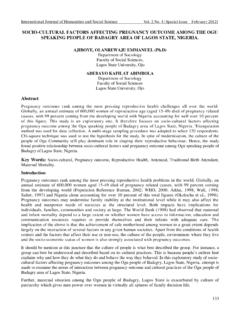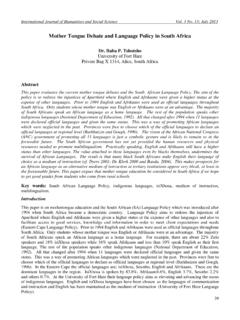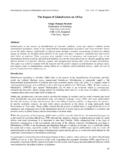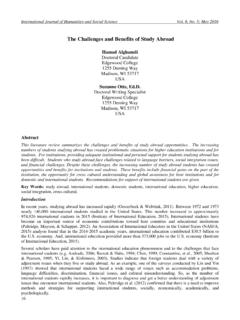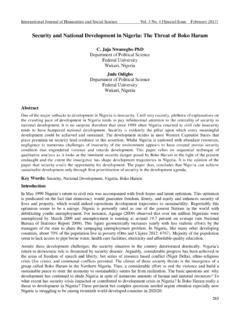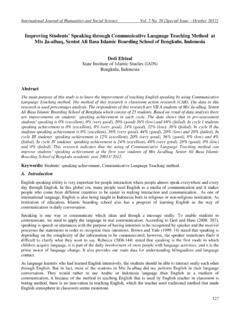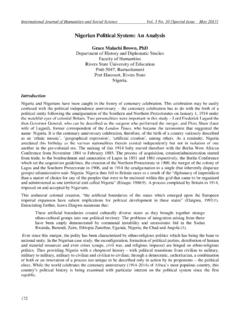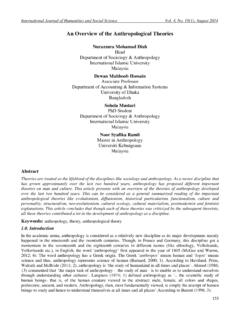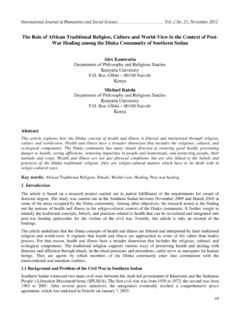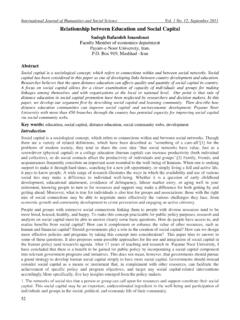Transcription of Evaluation of Curriculum Development Process
1 International Journal of Humanities and Social Science Vol. 1 No. 14; october 2011 263 Evaluation of Curriculum Development Process Afzaal Hussain Doctoral Research Scholar Division of Education University of Education College Road, Township, Road Lahore, Pakistan Dr. Ashiq Hussain Dogar Controller Examinations University of Education College Road, Township, Road Lahore, Pakistan Muhammad Azeem Assessment Expert Punjab Education Assessment System (PEAS) University of Education College Road, Township, Lahore, Pakistan Azra Shakoor Doctoral Research Scholar University of Education College Road, Township, Lahore, Pakistan Abstract The essence of the achievement of Curriculum objectives depends on its Evaluation Process during Development . If the Process indicators involve comprehensively at grass root level the product will be valid for use.
2 Content selection regarding objective consideration and with respect to the content organization is somewhat critical during the Process of Curriculum Development . Since often no Evaluation of the implemented Curriculum is carried out; hence no feedback is received to revise the Curriculum . This study addresses the Curriculum Development Process issues. A validated questionnaire consisting of 84 statements was developed. Data was collected from 810 personals involved in Curriculum Development Process and analyzed by Statistical Packages for Social Sciences (SPSS) using Chi Square. Result shows a significant association between existing Process and desired Process for Curriculum Development . Some new trends showed a mark difference like Memorandums of Understanding, Expressions of Interest, study tours and learner cognitive level. 1. Introduction Process Evaluation is believed as Guarantee of Quality product.
3 Evaluation of the Process of Curriculum Development plays a vital role in channelizing and keeping the direction of young generation on the desired way for the achievement of national objectives and keeping the system update respect to changing scenario of time. Curriculum Development Process also undergoes transformation due to newer developments in education and its Evaluation keeps it valid, reliable and keeps it in the right direction. Recommendations through Evaluation for any Process have a message of eternity for it. Therefore the needs to organize the Curriculum Development Process in such a way which should prepare young men and women for pursue of the higher education as well as to make them able to adjust with their practical life meaningfully and productively are necessary. Because the goals of education can be attained only through valid reliable Curriculum and proper Evaluation of the Process for updating and fulfilling required social needs.
4 2. Literature Review There are numerous uses of the word Curriculum . The Concise Oxford dictionary defines it as Course of Study and notes that it derives from the Latin word for a chariot race-course. The Curriculum as a race with series of hurdles to be overcome might still be a view held by a number of you today. Centre for Promoting Ideas, USA 264 Print, (1993, ) Curriculum is an area of vital importance to the professional teacher. Over the past two decades the study of Curriculum has become an established part of teacher education programmes. Therefore, teachers need to be knowledgeable about Curriculum and understand the processes by which curricula may be developed. When teachers consider Curriculum issues, for example, they tackle the substantive matter of schooling which may be expressed in terms of the fundamental questions of Curriculum namely.
5 (i) What to teach? (ii) How to teach? (iii) When to teach? (iv) What is impact of teaching? What knowledge is of most worth to learn? What activities are most effective in enabling learners to acquire this knowledge (information, facts, skills, values, attitudes etc)? Wheat is the most appropriate way to organize these activities. How do I know if learners have acquired this knowledge? Characteristics of a Good Curriculum : Following are the characteristics of good Curriculum Development of Social Understanding: Promotion of Maximum Personal Development : Promotion of Continuity of Experience: Provision for Educational Goals: Maintenance of Balance among All Goals: Utilization of Effective Learning Experiences and Needed Resources Curriculum Development Process Situation Analysis: Nicholls and Nicholls (1974, ) refer to the Process of situation analysis as, A situation which is made up of a number of factors such as pupils home and background, school, its climate, its staff, facilities and equipment.
6 Analysis of those factors, together with a self analysis, followed by study of their implications for Curriculum planning constitutes one step towards the rational approach of Curriculum . Print, (1993, ) a situation analysis is an obvious commencement point for the construction of a Curriculum it is an ideal opportunity for Curriculum developers, aware of the Curriculum presage factors affecting them, to bring a reasoned, rational approach to the Development of curricula. Above all, it is an opportunity for Curriculum developers to take account of local factors when developing Curriculum to meet student needs. Analysis of factors which constitute the situation: a) Cultural and social changes and expectations including parental expectations, employer requirements, community assumption and value, changing relationships ( between adults and children) and ideology.
7 B) Educational system requirements and challenges, policy statements, examinations, local authority expirations or demands or pressures, Curriculum projects, education research. c) The Changing nature of the subject matter to be taught. d) The potential contribution of teacher-support system, teacher training college, research institutes. e) Flow of resources into the school. f) Pupils: aptitudes, abilities and defined education needs. g) Teachers: value, attitudes, skills knowledge, experience, social strengths and weaknesses, roles. h) School ethos and political structure: Common assumptions and expectations including power conformity to norms and dealing with deviance. i) Material resources including plant, equipment, and potential for enhancing these. j) Perceived and felt problems and shortcomings in existing Curriculum . Nicholls and Nicholls (1974, ) the need for conducting a situational analysis is fundamental precept of effective Curriculum Development .
8 Developers commencing their task should ask important questions such as, what do we know about the context the students, teachers, school environment of this Curriculum and why is it need? This provided then with an information base to pose an even more fundamental question: what do our learners need?A recommended approach to conduct a situational analysis involves four steps i) identify problems in contents; ii) select approach factors; iii) data collection; and analysis iv) make recommendations. International Journal of Humanities and Social Science Vol. 1 No. 14; october 2011 265 3. Curriculum Evaluation Curriculum Evaluation refers to the collection of information on which judgment might be made about the worth and the effectiveness of a particular programme. It includes, of course, actually making those judgments so that decision might be made about the future of programme, whether to retain the programme as it stand, modify it or throw it out altogether.
9 Stocked approaches Curriculum Evaluation through a conceptual analysis of the term Evaluation , in his analysis, he identifies four central features of Evaluation given under: 1. Evaluation is appraisal in which we make judgment. 2. Such judgments are made in the light of criteria. 3. Criteria issue from, and are appropriate in respect of particular contents. 4. Such Criteria embody human resources, and Evaluation model, therefore, inform decisions. The important methods and techniques employed in Curriculum Evaluation include discussion, experiments, interviews (group and personal) opinion of various agencies stakeholders, observation procedures, questionnaires, practical performance and official record. Guba and Stufflebeam (1970, ) identify four types of decision which are involved in Curriculum Evaluation certain features of their work are useful as an organizing framework for examining Curriculum Evaluation .
10 These types include the decision about: 1. Planning intention, , which objectives to select. 2. Planning procedures, , which personnel, methods and material employ. 3. Implementing procedure, , whether to continue, modify or abandon a procedural plan. 4. Outcomes, , which intentions are realized, to extent and by whom. Evaluation conceived in this manner is an integral part of Curriculum Development , beginning with the concern about objective and ending with assessment of their attainment. 4. Models of Evaluation It should now be clear that Evaluation is nothing if not a problematic business, and in summarizing the nature of difficulties it is logical to look first at ways in which Evaluation might proceed. In considering how to evaluate, we can think of a range of approaches or models. There are many different Evaluation models, because different specialists have undergone somewhat different experiences in learning and doing Evaluation and used different values and world views in reflecting on their experiences.
